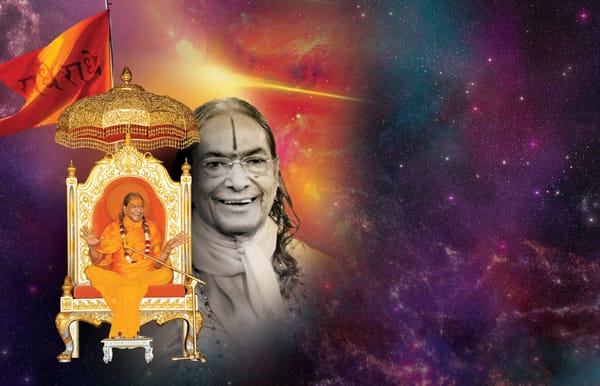Daily Devotion - May 6, 2025 (English)- Krishna's Call

Sadhak's Question: In kirtans, the flute is said to hold a special place. For instance, in one of your pads, "Kabahun sakhi hamahu dekhihaun Shyām" (Prem Ras Madira, Dainya Madhuri, pad no. 19), you have written, "Kaha 'Kripālu' ik aur murlidhuni, ghāyal kar avirām". Why is the flute said to have the most impact on the Gopi, piercing her heart?
Shri Maharaj Ji’s Answer: That is not what it means. In this verse, the Gopi expresses how she has been wounded by one aspect of Shri Krishna, and then by another. At that point, the poet Kripalu Ji comes in and tells her, “Let me remind you of one thing you have forgotten - there is also the flute.”
Certain aspects of Shri Krishna can be perceived through the eyes. However, for those who do not receive His darshan, the melody of His flute fulfills that purpose. For example, when Shankar Ji was in samādhi, He heard the sound of Shri Krishna's flute and immediately rushed to Vrindavan. Thus, when the visual sense is unable to perceive Him, the flute compensates. And when the visual sense is able to perceive Him, then all aspects of His divinity are perceived together.
Shri Krishna is non-different from His divine body. Every pore of His being radiates a unique, ever-increasing, and eternally new divine bliss. Therefore, there is no question of one aspect being "more blissful" than another. In the human body, different parts serve different functions and belong to different categories - some are superior, some of middle grade, and others are considered inferior. However, such distinctions do not exist in Thakur Ji’s divine form. His entire body is made of divine nectar, pervaded with the same bliss throughout. It is like candy molded into different shapes - a horse, an elephant, or a gentleman. Regardless of the form, it is all sugar. Now, can one say that the gentleman's nose is sweeter than his eyes or his teeth? The sweetness is uniform.
Follow-up Question: Then, Maharaj Ji, why is the flute considered to evoke the highest sentiments in devotion?
Shri Maharaj Ji's answer: The sound of the flute can be heard even without direct darshan (seeing Him). Moreover, the means by which Shri Krishna bestows His grace are varied.
Kānha ki jādhubhari muskān is a pad by Shri Maharaj Ji (in Prem Ras Madira, Shri Krishna Madhuri):
jina dekhī tina bisari gaī china... - Those who saw Him naturally became ecstatic.
jina nahiṃ dekhī, sunī tinahuṃ mana, lahakata suni guna-gāna - Those who did not see Him, their heart was enchanted upon hearing the melody of His flute.
"jina nahiṃ dekhī" - The one who did not see Him, "tin dekhan kahan, terat murlihin taan" - To awaken their yearning to see Him, Shri Krishna played the flute, so that they would be stirred with restlessness, wondering, "Who is playing such a sweet melody?"
And those who neither saw Him nor heard His flute felt an intense longing for His darshan simply by singing His glories. It was through this very act of singing His glories that Shukdev became enchanted. Similarly, all of you are progressing by hearing and singing His glories.
(Many people come to Shri Maharaj Ji's satsang just after listening to his cassettes.)
Attraction and surrender to God are not limited to the present time alone. Though they manifest at present, the relationship with God is very old - it is not as if it suddenly happens at that moment. God attracts and inspires the soul to progress towards Him as the fruit of past devotional practices, without any deliberate effort on the part of the individual soul. He inspires the soul from within, saying, "Go in that direction, be drawn, move forward." All this happens automatically, like a machine.
Sadhak: 'Maharaj Ji! I was on the wrong path earlier. But then I became associated with you and became a satsangi.'
Shri Maharaj Ji's response: You are still wrong. You haven't become right yet. You have just started making progress. You still get agitated over trivial matters.
A learned scholar went to Shankaracharya to become his disciple. Shankaracharya said that he was not qualified. The scholar replied, "Forgive me - please have a scriptural debate with me if you would like to test my knowledge." Shankaracharya said, "You came to become a disciple, and now you are attacking me. Do this - come tomorrow - until then, I'll think about it."
The next day, before the scholar arrived, Shankaracharya told a sweeper woman, "A scholar is coming here. When he gets near, throw dust on him with your broom."
When the sweeper woman threw dust on him with her broom, the scholar hurled fifty curses at her, saying, "Are you blind? Can't you see? You've made me impure." Then, when he came to Shankaracharya, he said, "You still rush to devour people in anger - how can you be qualified for knowledge of Brahm? Go, do Govardhan parikrama, sing kirtans, and practice devotion to Shri Krishna, for one year. Come to me when your mind is purified."
After practicing for a year, when he returned, Shankaracharya told the sweeper woman, "Now he has done devotional practice for a year, so just throwing dust won't work. While sweeping, touch his feet with the broom and say it happened by mistake." She did so, and the scholar looked at her angrily, grinding his teeth, and went ahead to Shankaracharya.
Shankaracharya said, "Your mind is still not purified; you still growl. You still have the pride of being a scholar, a Brahmin, etc. Go and practice more."
Then, the scholar went back and kept weeping and singing, praying to Radha Krishna, saying, "Bless me so that my Guru accepts me." Then his mind was purified. He practiced diligently. Not like you - practicing when you feel like it, thinking about worldly matters or devotees when you feel like it, seeing faults in others when you feel like it, sleeping when you feel like it - not like that. He practiced twenty-four hours - tailadhārāvadavicchinna, yathā gaṅgāṁbhaso'mbudhau - continuously like the unbroken flow of oil, like the waters of Ganga flowing into the ocean.
This time, Shankaracharya told the sweeper woman, "This time he won't get angry just by the touch of the broom - dump the basket of garbage over his head." The sweeper woman did so, and he fell at her feet saying, "Mother! You are the one who brought me to the Guru!"
So you haven't become alright yet. Never think that you have, even by mistake. As long as you identify with the body and cannot joyfully endure insults from others, you are not yet fully rectified. If one thinks, "I am completely reformed now," that itself indicates that one is not reformed. The more you progress, the more you will feel "I can never be right" - that is the true indication of being reformed. Currently, you react to words - you are at such a low level that you instantly retort back, even to your Guru. You have many faults that still need to be rectified. Like students who study day and night just four days before exams, you have not made such sincere efforts even for a month. There is a terrible disease in you of finding faults in others. You think, "This person is bad, that person is bad, this one is like this, that one is like that." This increases your pride. You don't make efforts to stop this.
Many aspiring devotees in our country try to practice devotion on their own without having surrendered to a Guru. They become imbued with pride upon making a little progress and experiencing a slight bliss of God's nectar. They confidently start claiming to others, "I have attained God." The form they made with their mind may have appeared so extraordinarily beautiful at some point, making them feel as if they had directly witnessed Shyamsundar's divine form. However, that was merely an illusory experience, darshanābhās. All this happens in the stage of Bhāv-bhakti. If one does not have a genuine Guru, such a guru would confirm, "Yes, you have attained God." But an authentic guru would warn, "Do not be deluded. Keep progressing. The goal is still far away." The guidance of a genuine Guru is required at every step.
You are all progressing at a sluggish pace in your devotional practice, as slow as a python, which moves the slowest. You have not even considered that you could die tomorrow. Otherwise, you would not sleep at all and would intensely strive day and night. The speed at which one progresses determines how quickly one will reach the destination. The only consolation is that you have chosen the right path. If you continue on this path, you will eventually reach the goal. But none of you are presently advancing in the way that is truly needed. You are not sincere even during kirtans, and after kirtans, you indulge in unnecessary conversations all day long. Whatever words come out of this material intellect will only lead to your harm. And it is not just the youth who do this - even the elderly who know they could die any day, engage in such unessential talk. If the kirtan is not going on, then engage in a higher form of devotion at that time - just sit in one place and shed tears for God. Devotional practice is not limited only to kirtans.
Sadhak's Question: But one attains the glimpse of Shyamsundar also only by the Guru's grace, is it not?
Shri Maharaj Ji's answer: It is true that even uttering one name of God is possible only by the grace of God and Guru. However, it is your duty to properly utilize and take full advantage of that grace to accelerate your own spiritual advancement. You must always be conscious that by Their grace alone, the mind, which has been spoiled over innumerable past lives, can utter God's divine names. But that does not mean that God or Guru will directly grant you God-realization. It is your duty to diligently practice devotion to make further progress.
Their first grace is that you received a human body. Then you were born in a house where people weren't atheists. Then, you met someone who told you about God and gave you some books to read. Through these connections, you reached the right place. There, you attained philosophical knowledge. Then, you began devotional practice. This is all God's grace and Guru's grace in all aspects. This mind, which even yogis have given up on controlling, Shri Maharaj Ji has brought it to such a point that if we're traveling on a bus somewhere and someone stretches and says "Radhey", we're startled that they said 'Radhey' - you develop so much attachment that you become restless without talking to them. All this is your inner feeling - this is a very significant thing. This is a milestone.
The biggest flaw is finding faults in others and considering oneself superior. This defect is so formidable that it destroys all good qualities. To think ill of God and Guru is a grievous offense known as nāmāparādh. But finding fault in other aspiring devotees is also extremely dangerous. To contemplate on others' faults with the same mind that one contemplates on God and Guru is like repeatedly applying detergent to clothes to clean them and then dipping them in dirt. Giving free rein to the mind with the pride that "I understand everything" - these are formidable enemies. They are ever ready to drag you down, yet you remain careless.
Otherwise - kṣaṇaśaḥ kṣaṇaśo'vidyā। kaṇaśaḥ kaṇaśo'dhanaṃ - just as a greedy person meticulously endeavors to accumulate wealth penny by penny, similarly, you would strive to utilize every moment in devotion, at least when you are free from worldly duties. Do not indulge in useless talks. One who does not always perceive God and Guru with them at all times is a complete atheist. Astītyevopalabdhasya tattvabhāvaḥ prasīdati -
If one does not have the feeling that God is constantly watching, listening, thinking, and understanding everything about us, and is always with us, it makes one an atheist.
Recommended books by Jagadguru Shri Kripalu Ji Maharaj related to this topic:





